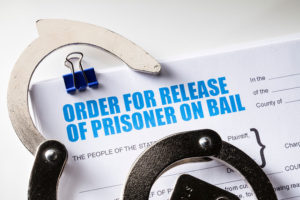Preparing you and your family for the return of your incarcerated loved one can be beneficial to your loved one’s reentry … and your family’s adjustment. Here are eight ways to prepare for a loved one’s reentry.
1. UNDERSTAND THEIR PROBATION AND PAROLE
 When your loved one is released from prison, they will most likely have conditions of parole. Some of these conditions may include: curfew, geographic limits, mandatory job search, drug or alcohol tests, community treatment center attendance, electronic monitoring, and many other possibilities.
When your loved one is released from prison, they will most likely have conditions of parole. Some of these conditions may include: curfew, geographic limits, mandatory job search, drug or alcohol tests, community treatment center attendance, electronic monitoring, and many other possibilities.
If possible, the best way to help your loved one comply with their restrictions is to develop a relationship with their probation officer and ensure that you are knowledgeable concerning the details of their parole. This will ensure that both you and your loved one are aware of all conditions of release and will minimize the chance of a parole violation as a result of miscommunication.
For more information, check out “Probation and Parole Requirements.”
2. SAVE MONEY
When your loved one comes home, they will need some time to get back on their feet. It will take time to readjust to the culture outside prison, relearn how to schedule their time, and find a job. During this process, they will most likely need financial support for their food, clothes, and housing.
If you are able to support your loved one, make it clear that your financial support is short term and conditional on their efforts to find a job and become financially independent.
3. PLAN FOR YOUR RELATIONSHIP
The days before your loved one is released are exciting. You are envisioning your lives as they had been in the past and looking forward to finally spending time with your loved one again. But after the first few days or weeks, challenges will arise.
You will need a plan for when the initial excitement wears off. Both you and your loved one should have an in-person conversation about what your relationship will look like after the excitement, including your physical and emotional boundaries.
Develop a plan for the hard days, the employment search, and the best way to address your children’s potential reactions.
For your loved one, building family relationships and developing ties to the community are key in making sure that he or she does not put themselves in a situation that may lead back to prison. By looking ahead and planning for the various emotional stages of their reentry, you will both be better prepared to face the challenges.
4. LOOK AHEAD TO FUTURE NEEDS
Before your loved one’s release, consider finding resources that you or your family may need in the future. Even if you do not believe that you will need them now, it is better to be prepared for the unexpected.
There are nonprofits and other organizations that provide resources for financial support, food, and shelter. In addition, you can also find resources for clothing, transportation, and health care.
Be sure to keep an eye out for family therapy and individual mental health support.
Finding employment assistance, education, and training services will help when your loved one begins to look for a job.
And don’t forget about the kids—reach out to organizations that offer help in child supervision and even holiday needs.
Locate one or two resources for each of these categories, and discuss with your loved one what resources he or she believes they will need upon release.
5. FIND POTENTIAL SUPPORT GROUPS AND CHURCHES
 Your family will need to readjust to your loved one being home and the potential behavioral changes resulting from incarceration.
Your family will need to readjust to your loved one being home and the potential behavioral changes resulting from incarceration.
Church and support groups with other like-minded individuals will provide a source of friendship, stability, trust, and advice for when the times get tough. Having a larger network of friends will help each person in your family get through the tough times together.
6. GET READY FOR YOUR LOVED ONE’S JOB SEARCH
Your loved one’s job search may be one of the most challenging parts of reentry. Many companies are wary about hiring individuals with a criminal record, which will make your loved one’s job search more challenging.
Before they are released, consider researching groups that assist former prisoners with their job search. Look for companies that have “banned the box” and stated that they are proponents of second chances and are willing to hire individuals with a criminal history.
Furthermore, because your loved one’s job search is going to be challenging, you must prepare for the emotional strain of the search as well. Your loved one will likely have feelings of frustration and anger. Prepare for this, and remind your loved one that all it takes is one successful interview.
For additional help, please see our employment resources:
- HOW TO FIND A JOB AFTER PRISON
- HOW TO WRITE A RESUME WHEN YOU HAVE A CRIMINAL RECORD
- ACE YOUR INTERVIEW
- TEN COMPANIES IN THE BUSINESS OF SECOND CHANCES
7. TALK TO YOUR CHILDREN
 Before your loved one returns home, you will need to prepare your children. Just like when your husband or wife was initially incarcerated, your kids will need time to adjust to the sudden change in family dynamic and home life. They may be angry at their parent for seemingly abandoning them, or they may feel like their space is invaded when your loved one is initially released and moves back home. These potential feelings need to be discussed before they happen.
Before your loved one returns home, you will need to prepare your children. Just like when your husband or wife was initially incarcerated, your kids will need time to adjust to the sudden change in family dynamic and home life. They may be angry at their parent for seemingly abandoning them, or they may feel like their space is invaded when your loved one is initially released and moves back home. These potential feelings need to be discussed before they happen.
Consider talking with your children about how they feel about their father or mother coming back from prison. Talk to them about how life is about forgiveness. Focus on teaching them that when someone does something wrong, they must face the consequences, forgive themselves, and change for the better.
Other resources available for children with incarcerated parents:
- FAQS ABOUT CHILDREN OF PRISONERS
- IMPACT OF INCARCERATION ON CHILDREN
- RAISING CHILDREN WITH A PARENT IN PRISON
- IMPACT OF INCARCERATION ON CAREGIVERS
8. CONSIDER RELATIONSHIP COUNSELING
If it is your husband or wife being released from prison, your relationship is about to experience a sudden change, much like the sudden change you felt when he or she was initially incarcerated. There will be excitement and joy with this change, but there are also certain aspects of your relationship that need to be discussed. Relationship counseling will help you and your loved one identify what needs to be resolved and how to work through them in the easiest way possible.
Talk with your husband or wife about finding a local relationship counselor and prepare a few topics or questions you would like to explore with your counselor and loved one.
EIGHT WAYS TO PREPARE FOR A LOVED ONE’S REENTRY
Download and share this resource with families and friends of the incarcerated.
DOWNLOAD